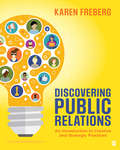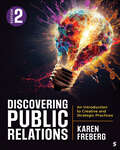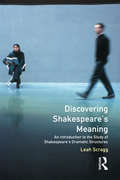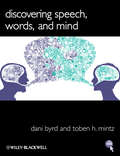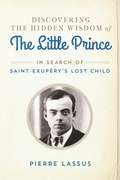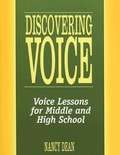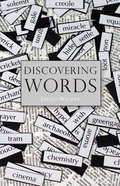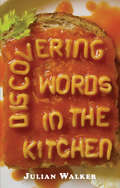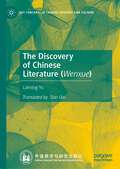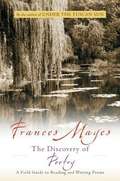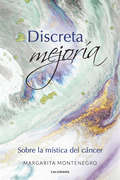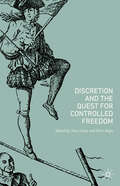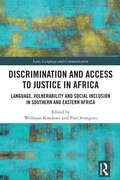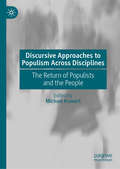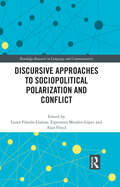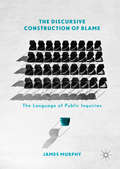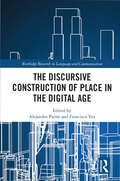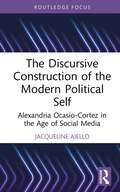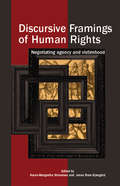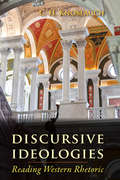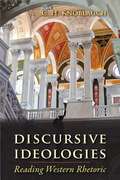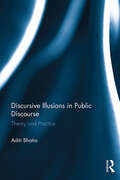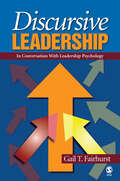- Table View
- List View
Discovering Public Relations: An Introduction to Creative and Strategic Practices
by Karen FrebergDiscovering Public Relations introduces students to the field of PR in a practical, applied, and hands-on way that prepares them for the modern workplace. Author Karen Freberg guides students through the evolution of contemporary PR practices with an emphasis on social media, digital communication, creativity, and diversity. Understanding that innovation alone can&’t create success, Freberg shows students how to use, choose, and implement evidence-based practices to guide their strategic campaigns. The text will transform today&’s students into tomorrow&’s successful PR professionals by giving them the tools to think creatively, innovate effectively, and deploy research-backed tactics for successful campaigns.
Discovering Public Relations: An Introduction to Creative and Strategic Practices
by Karen FrebergDiscovering Public Relations introduces students to the field of PR in a practical, applied, and hands-on way that prepares them for the modern workplace. Author Karen Freberg guides students through the evolution of contemporary PR practices with an emphasis on social media, digital communication, creativity, and diversity. Understanding that innovation alone can&’t create success, Freberg shows students how to use, choose, and implement evidence-based practices to guide their strategic campaigns. The text will transform today&’s students into tomorrow&’s successful PR professionals by giving them the tools to think creatively, innovate effectively, and deploy research-backed tactics for successful campaigns.
Discovering Public Relations: An Introduction to Creative and Strategic Practices
by Karen FrebergDiscovering Public Relations introduces students to the field of PR in a practical, applied, and hands-on way that prepares them for the modern workplace. Author Karen Freberg highlights modern and contemporary PR practices, emphasizing social media, digital communication, and creative innovation. Understanding that creativity alone can’t create success, Freberg shows students how to choose and implement evidence-based practices to guide their strategic campaigns. The Second Edition transforms students into successful PR professionals by giving them the tools to think creatively, innovate effectively, and deploy research-backed tactics for successful campaigns. This title is accompanied by a complete teaching and learning package. Contact your Sage representative to request a demo. Learning Platform / Courseware Sage Vantage is an intuitive learning platform that integrates quality Sage textbook content with assignable multimedia activities and auto-graded assessments to drive student engagement and ensure accountability. Unparalleled in its ease of use and built for dynamic teaching and learning, Vantage offers customizable LMS integration and best-in-class support. It’s a learning platform you, and your students, will actually love. Learn more. Assignable Video with Assessment Assignable video (available in Sage Vantage) is tied to learning objectives and curated exclusively for this text to bring concepts to life. Watch a sample video now. LMS Cartridge: Import this title’s instructor resources into your school’s learning management system (LMS) and save time. Don’t use an LMS? You can still access all of the same online resources for this title via the password-protected Instructor Resource Site. Learn more.
Discovering Public Relations: An Introduction to Creative and Strategic Practices
by Karen FrebergDiscovering Public Relations introduces students to the field of PR in a practical, applied, and hands-on way that prepares them for the modern workplace. Author Karen Freberg highlights modern and contemporary PR practices, emphasizing social media, digital communication, and creative innovation. Understanding that creativity alone can’t create success, Freberg shows students how to choose and implement evidence-based practices to guide their strategic campaigns. The Second Edition transforms students into successful PR professionals by giving them the tools to think creatively, innovate effectively, and deploy research-backed tactics for successful campaigns. This title is accompanied by a complete teaching and learning package. Contact your Sage representative to request a demo. Learning Platform / Courseware Sage Vantage is an intuitive learning platform that integrates quality Sage textbook content with assignable multimedia activities and auto-graded assessments to drive student engagement and ensure accountability. Unparalleled in its ease of use and built for dynamic teaching and learning, Vantage offers customizable LMS integration and best-in-class support. It’s a learning platform you, and your students, will actually love. Learn more. Assignable Video with Assessment Assignable video (available in Sage Vantage) is tied to learning objectives and curated exclusively for this text to bring concepts to life. Watch a sample video now. LMS Cartridge: Import this title’s instructor resources into your school’s learning management system (LMS) and save time. Don’t use an LMS? You can still access all of the same online resources for this title via the password-protected Instructor Resource Site. Learn more.
Discovering Shakespeare's Meaning: An Introduction to the Study of Shakespeare's Dramatic Structures
by Leah ScraggIn this useful guide, Leah Scragg indicates some of the ways in which meaning is generated in Shakespearian drama and the kinds of approaches that might lead to a fuller understanding of the plays. Each chapter focuses on one aspect of the dramatic composition, such as verse and prose, imagery and spectacle, and the use of soliloquy, and explores how this contributes to the overall meaning. Written in a clear and helpful style, Discovering Shakespearian Meaning enables students to discover the meaning for themselves.
Discovering Speech, Words, and Mind
by Dani Byrd Toben H. MintzWritten in a lively style, Discovering Speech, Words, and Mind applies a scientific approach to the study of various aspects of speech, using everyday examples to introduce the beginning student to the world of language and cognition. An accessible introduction to the fundamentals of speech production, speech perception, word-formation, language acquisition and speech disorders Considers how the informational content of the speech signal relates to phonological units – connecting the three areas of speech, words, and mind Focuses on speech production and recognition at the word-level and below, and includes sign languages Written in a highly accessible style for students with no background in linguistics or psychology Packed with numerous student-friendly features, including engaging examples, illustrations, and sidebars for further discussion; further online exercises and data also available at http://www.discoveringspeech.wiley.com/
Discovering the Hidden Wisdom of The Little Prince: In Search of Saint-Exupéry's Lost Child
by Pierre LassusFinally, one of the most of the most beloved books every published—explained. The Little Prince is revered around the world. Two hundred million copies have been sold in 270 languages; it is the fourth best-selling book of all time. Part of its allure is that is seems incredibly wise but so simple it is read as a work for children. Yet its meaning is elusive, and its place amid the writings of an adventurer and war hero acclaimed for dramatic bestsellers like Night Flight and Flight to Arras is mysterious. In this elegant, carefully argued book, Pierre Lassus reexamines the story of The Little Prince against the facts of Saint-Exupéry's own extraordinary life, from his cherished but fatherless childhood in aristocratic poverty to his career as a pioneering pilot. His plane had broken down in the desert before. He had adopted a fox, when posted at the Spanish fort of Cape Juby, in southern Morocco. He had known the world of business before becoming pilot; he had also known unrequited love. Like his little protagonist's, his body was never found after his plane disappeared in World War II. He was working on his spiritual autobiography when he died, and there too, Lassus finds resonances and keys to the understated spirituality of his last great book.
Discovering Voice: Voice Lessons For Middle And High School
by Nancy DeanLessons on diction, detail, figurative language, imagery, syntax, and tone help middle and early high school students understand the concept of voice in what they read and develop a strong, personal voice in their own writing. Each voice lesson takes only 10-20 minutes to complete and includes a quotation selected from a wide range of literature, two discussion questions, and an exercise that encourages students to practice what they have learned about the elements of voice. Discovering Voice also offers a collection of quotations students can use to create their own voice lessons. Discussion suggestions for each voice lesson and additional activities for teaching voice further promote critical analysis.
Discovering Words
by Julian WalkerFor 1500 years English has built new words or taken them from other languages and changed their form and often their meaning to make them the words we use today. When we explore the journeys, arrivals and changes of these words, they present us with some extraordinary stories. School for example, comes indirectly from the Greek word for leisure, and lord is made from Old English words meaning keeper of bread.This book presents the histories of some common words, showing how they have arrived at their present use and form. Entries are grouped into nearly twenty subject areas, such as home, transport, food; for each word the author shows how it was built from existing words, or how a root word in another language has been taken borrowed by English at a given point in history. Some of the voyages are via many other languages, some direct; some of them are extraordinary, some deceptively simple. Changes of spelling and meaning over time are presented, and where there are disagreements about where a word has come from these are discussed. The material is presented clearly and simply, and is supported by references within the text to previous writers and dictionaries.
Discovering Words in the Kitchen
by Julian WalkerThroughout history, the English language has reflected social changes, trade routes, and waves of fashion. This book examines the histories of the names of foods, ingredients, utensils, drinks, cooking methods, and dishes to show how the vocabulary of English has reflected the ways speakers of the language have interacted with their tastes, their environment and other cultures. 250 words which have entered English over the past fifteen hundred years are examined, ranging from Old English adoptions from Latin via French, to U.S. adoptions from Chinese. Changes of spelling and meaning and disagreements about the history of the words are discussed, supported by references within the text to authoritative food historians and dictionary writers from Johnson and Webster to the most recent publications.
The Discovery of Chinese Literature (Key Concepts in Chinese Thought and Culture)
by Laiming YuThis book traces the origin and evolvement of two Chinese characters “wenxue”(literature) by using the methods of conceptual history and historical and cultural semantics, and by taking the evolution and changes of the concept of the these two characters and their interpretations in the west as a window, and re-examining the contemporary morphology of concept evolution in the historical context of concept generation and development to discover the historical and cultural connotations hidden behind the characters, so as to embark on a vivid journey to explore the history of literary thought, discipline and culture. The entire book is woven with the concept of “literature” at its core. Following the author's analysis and interpretation, an interlocking and orderly network of description of ancient and modern, Chinese and foreign unfolds. In this context, the chapters are progressive and mutually responsive, forming an organic whole which is connected at the beginning and the end. For those readers who are trying to understand how Chinese “wenxue” evolved from one of the “four disciplines of Confucius” into a modern discipline and concept, this book will provide the most detailed, in-depth, and vivid historical picture.
The Discovery of Poetry: A Field Guide to Reading and Writing Poems
by Frances MayesThe bestselling author of Under the Tuscan Sun brings poetry out of the classroom and into the homes of everyday readers. <P><P>Before she fell in love with Tuscany, Frances Mayes fell in love with verse. After publishing five books of poetry and teaching creative writing for more than twenty-five years, Mayes is no stranger to the subject. In The Discovery of Poetry, an accessible "field guide" to reading and writing poetry, she shares her passion with readers. Beginning with basic terminology and techniques, from texture and sound to rhyme and repetition, Mayes shows how focusing on one aspect of a poem can help you to better understand, appreciate, and enjoy the reading and writing experience. In addition to many creative and helpful composition ideas, following each lyrical and lively discussion is a thoughtful selection of poems. With its wonderful anthology from Shakespeare to Jamaica Kinkaid, The Discovery of Poetry is an insightful, invaluable guide to what Mayes calls "the natural pleasures of language-a happiness we were born to have."
Discreta mejoría: Sobre la mística del cáncer
by Margarita MontenegroSapere aude, atrévete a saber. Esta es la historia de una mujer treintañera que, con un diagnóstico mortal tras el nacimiento de su primer hijo, lejos de resignarse, se dedicó en cuerpo y alma a encontrar otras vías para sobrevivir. Este libro relata sus días y noches de lectura intensa en varios idiomas, los viajes que emprendió a otros países buscando respuestas, las reuniones con todo tipo de personas, tanto ensalzadas como despreciadas en el mundo médico y científico. También revela la investigación en profundidad que realizó y los hilos de los cuales debió tirar para encontrar respuestas con enormes dificultades; y cómo, tras descubrirlas, decidió asumir un camino del que casi todo el mundo la quería disuadir. Cuenta, con una narrativa trepidante, cómo profundizó, entre otros ámbitos, en el mundo de la medicina, la psicología, la industria farmacéutica, la comunicación o la economía política del cáncer. Uncamino en el que también descubrió, para su sorpresa, que las convenciones sociales en torno a la enfermedad, la maternidad o los estereotipos sobre las mujeres, en su entorno más cercano y lejano, eran en ocasiones mayores obstáculos que su pronóstico a la hora de afrontar su día a día. Sin embargo, este libro no aspira a ser un manual de autoayuda, aunque puede servir para abrirse a nuevas realidades y avanzar. Discreta mejoría quiere ir más allá, mostrando perspectivas que no han sido nunca tratadas en relatos similares, combinando la intriga científica con una historia de supervivencia y un ejemplo de lucha contra reloj para cualquier persona que se enfrente a un reto vital.
Discretion and the Quest for Controlled Freedom
by Tony Evans Peter HupeLooking at discretion broadly as the exercise of controlled freedom, this edited volume introduces insights from a range of social sciences perspectives. Traditionally, discussions of discretion have drawn on legal notions of the appropriate exercise of legitimate authority specified by legislators. However, empirical and theoretical studies in the social sciences have extended our understanding of discretion, moving us beyond a narrow legal view. Contributors from a range of disciplines explore the idea of discretion and related notions of freedom and control across social and political practices and in different contexts. As this complex and important topic is discussed and examined, both total control and unconstrained freedom appear to be illusions.
Discrimination and Access to Justice in Africa: Language, Vulnerability and Social Inclusion in Southern and Eastern Africa (Law, Language and Communication)
by Wellman Kondowe Paul SvongoroThere are different forms of discrimination. Among others, people can be discriminated against on the basis of their ethnic grouping, political affiliation, race, gender, age, and language. This book focuses on linguistic discrimination in Africa, acknowledging that language plays a key role in the delivery of justice and much of what transpires in justice systems deals with language use. It argues that to achieve fairness, the state has a responsibility to put in place accommodations aimed at reducing linguistic vulnerability. The collection interrogates some of the issues that are common in Africa, which is arguably one of the most linguistically diverse continents in the world, bringing together a collection of case studies from Malawi, South Africa, Zimbabwe, Tanzania, Kenya, and Zambia. It presents practical insights from academics, legal professionals, and social scientists. Divided into five thematic parts, the first addresses communication and linguistic challenges faced by children in the legal system. Theme 2 examines the position of witnesses with physical challenges. The third theme focuses on language as a barrier in access to justice. Theme 4 looks at the language of the court as a major barrier to the poor and the illiterate. The fifth and final theme examines the position of women in sexual assault cases. The collection will be of interest to academics, researchers, and policymakers working in the areas of law and language, human rights law, criminology, linguistics, and African Studies.
Discursive Approaches to Populism Across Disciplines: The Return of Populists and the People
by Michael KranertThis edited book presents a cross-disciplinary and international conversation about the discursive nature of ‘populist’ politics. Based on the idea that language and meaning making are central to the political process, the authors present research originating from disciplines such as sociology, political science, linguistics, gender studies and education, giving credence to the variety and context dependence of both populist discourse and its analysis. Using a variety of different theoretical frames, the volume examines international case studies from Europe, Africa, Asia and the Americas, looking at different modes of populism as well as the interaction of populism with other ideologies and belief systems. The chapters draw on several disciplines, and will be of interest to scholars working in linguistics, political studies, journalism, rhetoric and discourse analysis.
Discursive Approaches to Sociopolitical Polarization and Conflict (Routledge Research in Language and Communication)
by Laura Filardo-LlamasThis collection explores the discursive strategies and linguistic resources underpinning conflict and polarization, taking a multidisciplinary approach to examine the ways in which conflict is constructed across a diverse range of contexts. The volume is divided into two sections as a means of identifying two different dimensions to conflict construction and bridging the gap between different perspectives through a constructivist framework. The first part comprises chapters looking at socio-political conflicts across specific geographic contexts across the US, Europe, and Latin America. The second half of the book unpacks socio-cultural conflicts, those not defined by physical borders but shaped by ideological differences on core values, such as on religion, gender, and the environment. Drawing on frameworks across such fields as linguistics, critical discourse analysis, rhetoric studies, and cognitive studies, the book offers new insights into the discursive polarization that permeates contemporary communicative interactions and the ways in which a better understanding of conflict and its origins might serve as a mechanism for providing new ways forward. This book will be of particular interest to students and scholars in critical discourse analysis, linguistics, rhetoric studies, and peace and conflict studies.
The Discursive Construction of Blame: The Language of Public Inquiries
by James MurphyThis book examines the language of public inquiries to reveal how blame is assigned, avoided, negotiated and discussed in this quasi-legal setting. In doing so, the author adds a much-needed linguistic perspective to the study of blame – previously the reserve of moral philosophers, sociologists and psychologists – at a time when public inquiries are being convened with increasing frequency. While the stated purpose of a public inquiry is rarely to apportion blame, this work reveals how blame is nevertheless woven into the fabric of the activity and how it is constructed by the language of the participants. Its chapters systematically analyse the establishment of inquiries, their questioning patterns, how blame can be avoided by witnesses, how blame is assigned or not by an inquiry’s panel and how such blame may result in public apologies. The author concludes with an engaging discussion on the value of public inquiries in civic life and suggestions for changes to the processes of public inquiries. This book will appeal to readers with a general interest in public and political language; in addition to scholars across the disciplines of communication, media studies, politics, sociology, social policy, philosophy, psychology, linguistics, rhetoric, public relations and public affairs.
The Discursive Construction of Place in the Digital Age (Routledge Research in Language and Communication)
by Alejandro Parini Francisco YusThis collection calls greater attention to the need for a clearer understanding of the role of discourse in the process of placemaking in the digital age and the increasing hybridisation of physical and virtual worlds. The volume outlines a new conceptualisation of place in the time of smartphones, whose technological and social affordances evoke placemaking as a collaborative endeavour which allows users to create and maintain a sense of community around place as shareable or collective experience. Taken together, chapters argue for a greater emphasis on the ways in which users employ discourse to manage this physical-virtual interface in digital interactions and in turn, produce “remixed” cultural practices that draw on diverse digital semiotic resources and reflect their everyday experiences of place and location. The book explores a wide range of topics and contexts which embody these dynamics, including livestreaming platforms, mourning in the digital age, e-service encounters, and Internet forums. While the overlay of physical and virtual information on location-based media is not a new phenomenon, this volume argues that, in the face of its increasing pervasiveness, we can better understand its unfolding and future directions for research by accounting for the significance of place in today’s interactions. This book will be of interest to students and scholars in discourse analysis, digital communication, pragmatics, and media studies.
The Discursive Construction of the Modern Political Self: Alexandria Ocasio-Cortez in the Age of Social Media (Routledge Focus on Linguistics)
by Jacqueline AielloThis book explores the impact of new media on politicians’ construction, presentation, and dissemination of their political selves, focusing on the social media presence of US Representative Alexandria Ocasio-Cortez to offer new insights into the landscape of contemporary political discourse. Drawing on work from corpus linguistics, interactional sociolinguistics, and critical discourse analysis, Aiello charts the ways in which the politician employed a range of discursive strategies via social media in her first campaign to introduce her political identity to a wider audience, and the subsequent responses by media outlets. The volume examines how she continued to solidify her political agenda throughout the course of her tenure, unpacking her crafting of counterattacks and “clapbacks,” in particular, in counteracting delegitimizing attacks from both mainstream media outlets and user-generated content. Aiello brings these insights together to offer a more holistic understanding of American political discourse but also the intersection of language, power, ideology, and the role of social media in modern political campaigns and populist discourses. The book will be of interest to students and scholars in digital communication, political communication, critical discourse analysis, and sociolinguistics.
Discursive Framings of Human Rights: Negotiating Agency and Victimhood
by Karen-Margrethe Simonsen Jonas Ross KjaergardWhat does it mean to be a subject of human rights? The status of the subject is closely connected with the form and rhetoric of the framing discourse, and this book investigates the relationship between the status of the subject and the form of human rights discourse, in differing aesthetic and social contexts. Historical as well as contemporary declarations of rights have stressed both the protective and political aspects of human rights. But in concrete situations and conflictual moments, the high moral legitimacy of human rights rhetoric has often clouded the actual character of specific interventions, and so made it difficult to differentiate between the objects of humanitarian intervention and the subjects of politics. Critically re-examining this opposition – between victims and agents of human rights – through a focus on the ways in which discourses of rights are formed and circulated within and between political societies, this book elicits the fluidity of their relationship, and with it the shifting relation between human rights and humanitarianism. Analysing the symbolic framings of testimonies, disaster stories, atrocity tales, political speeches, and philosophical arguments, it thus establishes a relationship between these different genres and the political, economic, and legal dimensions of human rights discourse.
Discursive Ideologies: Reading Western Rhetoric
by C. H. KnoblauchIn Discursive Ideologies, C. H. Knoblauch argues that European rhetorical theory comprises several distinct and fundamentally opposed traditions of discourse. Writing accessibly for the upper division student, Knoblauch resists the conventional narrative of a unified Western rhetorical tradition. He identifies deep ideological and epistemological differences that exist among strands of Western thought and that are based in divergent "grounds of meaningfulness.” These conflicts underlie and influence current discourse about vital public issues. Knoblauch considers six "stories” about the meaning of meaning in an attempt to answer the question, what encourages us to believe that language acts are meaningful? Six distinctive ideologies of Western rhetoric emerge: magical rhetoric, ontological rhetoric, objectivist rhetoric, expressivist rhetoric, sociological rhetoric, and deconstructive rhetoric. He explores the nature of language and the important role these rhetorics play in the discourses that matter most to people, such as religion, education, public policy, science, law, and history.
Discursive Ideologies
by C. H. KnoblauchIn Discursive Ideologies, C. H. Knoblauch argues that European rhetorical theory comprises several distinct and fundamentally opposed traditions of discourse. Writing accessibly for the upper division student, Knoblauch resists the conventional narrative of a unified Western rhetorical tradition. He identifies deep ideological and epistemological differences that exist among strands of Western thought and that are based in divergent "grounds of meaningfulness." These conflicts underlie and influence current discourse about vital public issues.Knoblauch considers six "stories" about the meaning of meaning in an attempt to answer the question, what encourages us to believe that language acts are meaningful? Six distinctive ideologies of Western rhetoric emerge: magical rhetoric, ontological rhetoric, objectivist rhetoric, expressivist rhetoric, sociological rhetoric, and deconstructive rhetoric. He explores the nature of language and the important role these rhetorics play in the discourses that matter most to people, such as religion, education, public policy, science, law, and history.
Discursive Illusions in Public Discourse
by Aditi BhatiaThis book presents a unique perspective into the investigation and analysis of public discourses, such as those of the environment, politics, and social media, springing from issues of key relevance to contemporary society, including the War on Terror, the ‘Arab Spring’, and the climate-change debate. Employing a qualitative approach, and drawing on data which comprises both written and spoken discourses, including policy documents, political speeches, press conferences, blog entries, informational leaflets, and corporate reports, the book puts forward a unique theoretical framework, that of the Discourse of Illusion. The research draws on discourse analysis, in order to develop and implement a multi-perspective framework that allows a closer look at the intentions of the producer/actor of various discourses, power struggles within social domains, in addition to the socio-political and historical contexts which influence the individual repositories of experience that create multiple, often contesting, arguments on controversial issues, consequently giving rise to discursive illusions. Discursive Illusions in Public Discourse: Theory and practice intensively explores the discourse of illusion within multifarious dimensions of contemporary public discourses, such as: • Political Voices in Terrorism • Activist Voices in New Media • Corporate Voices in Climate Change This book will particularly appeal to researchers working within the field of discourse analysis, and more generally for students of postgraduate research and specialists in the field of language, linguistics, and media. The book can also be used as a guide for non-specialists in better understanding the complexities of public discourses, and how they shape society’s perceptions of some key social and political issues.
Discursive Leadership: In Conversation with Leadership Psychology
by Gail T Fairhurst2007 National Communication Association, Organizational Communication Division, "Best Book" AwardCiting the well known adage that there are as many definitions of leadership as there are leadership scholars, Fairhurst acknowledges the contributions which psychologists have made to leadership research, before probing the inevitable limitations to their formidable body of work. Fairhurst′s work is also thought provoking on the issue of authenticity on the part of leaders."—HUMAN RELATIONSDiscursive Leadership: In Conversation with Leadership Psychology presents a new, groundbreaking way for scholars and graduate students to examine and explore leadership. Differing from a psychological approach to leadership which tries to get inside the heads of leaders and employees, author Gail Fairhurst focuses on the social or communicative aspects between them. A discursive approach to leadership introduces a host of relatively new ideas and concepts and helps us understand leadership′s changing role in organizations. Key Features: Compares and contrasts discursive leadership with leadership psychology: This comparison facilitates a clearer definition of discursive leadership. Presents new ways to study leadership: By treating each discourse concept as a heuristic device and supporting each concept with examples, new ways to study leadership are introduced by focusing on key concepts from the organizational discourse literature. Addresses some key challenges within leadership psychology: Each chapter begins with an ongoing debate in leadership psychology and illustrates how a discursive approach can join that debate. Charimatic leadership, leader-member exchange, authentic leadership are just a few of the examples.Offers reactions from leadership psychologists: Leadership psychologists and other discourse scholars respond to the author′s proposed ′conversation′ between them broadening the debate and introducing new perspectives. Provides quick reviews and extended examples: The book includes critical summaries at the end of each chapter and easy-to-reference appendices. Intended Audience: This book helps scholars, researchers, and practitioners understand the complexities of leadership as it continues to evolve due to such influences as globalization, technology change, and democratization of the workplace. It is also an excellent text for graduate courses such as Leadership; Rhetoric of Leadership; Interpretive Studies of Organizational Communication; Organizational Communication; and Leadership & Communication in the departments of communication, business & management, psychology, and educational administration.
